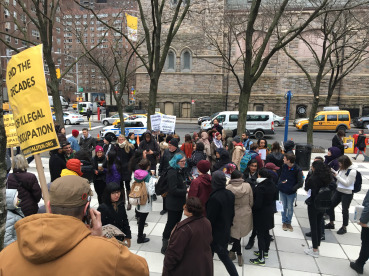Elise Zimmerman, FCRH’20, had never participated in any form of activism before arriving at Fordham. But on the night of Donald Trump’s election in November, she headed into Manhattan to protest the President alongside approximately 10,000 other New Yorkers.
“The one after the election was definitely angry,” she said. “But it was really nice because it was an outlet. I didn’t want to be cooped up in my dorm room all night.”
Zimmerman continued to protest, heading into Manhattan again a week after the election results and even taking the train down to D.C. to attend the Women’s March, which is becoming recognized as one of the largest demonstrations in U.S. history.
Now a member of the College Democrats and Women’s Empowerment, Elise is not the only Fordham student finding her voice in demonstrating on and off campus. More Fordham students are taking to protesting and participating in discourse on the issues they care about in the wake of the Trump election.
After Fordham Lincoln Center made headlines for vetoing the creation of the Students’ Justice in Palestine (SJP) club, students like Sapphira Lurie, FCLC ’17, responded by organizing rallies.
“Because the veto of SJP was blatantly discriminatory, the members of SJP felt the need to protest it, to shed light on our cause and on university censorship,” said Lurie in an email interview. She estimated more than 100 Fordham students turned out for the rally in response to the club veto by Keith Eldredge, Lincoln Center Dean of Students.
In a statement to the Fordham Ram, Dean Eldredge said the decision for the veto was made because, if created, SJP would be “more akin to a lobbying group than a student club.” Eldredge also charged Sapphira Lurie with an independent disciplinary hearing for organizing the protest of the veto on January 23. Lurie said the hearing has only bolstered her want to participate in student activism.
“Despite attempts by Dean Eldredge and the rest of the administration to silence and intimidate me and SJP, we will continue to make our presence known on campus through rallies, to demand full club status, and to educate our fellow students,” said Lurie.
For many Fordham students, clubs serve as the outlets for their newfound activism, and in turn, students are even breathing new life into old clubs.
Fordham’s Respect for Life club (RFL), a campus pro-life organization which advocates for “womb to tomb” policies, has in recent years faced controversy for its annual display on McGinley where flags are arranged to represent the amount of abortions in the U.S. In light of that, membership in the club dropped off, but club leaders say it has picked up again with this new and increasingly active freshmen class.
Emily Sayegh, FCRH ‘19 and president of RFL, said they are also changing the way they get active on campus. Scrapping the “Memorial of the Innocents” of years past, RFL plans to have an interactive board which asks students to mark on a birth timeline where they think life begins.
“Nothing hopefully will upset people, but more [to] be open to discussing and hearing each other’s different opinions,” said Sayegh.
Even under a federal administration which is positionally more friendly to the pro-life movement, Sayegh said RFL runs against what President Trump stands for, but she acknowledges that her club is going to get lumped together with Trump.
“We a lot of times have to defend ourselves and our positions because we get attacked a lot,” said Sayegh.“And it only encourages us to be more persistent and vocal about what we believe in.”
For Fordham’s College Republicans, activism in its members have not seen an increase, but discussion and discourse are more alive than ever.
VP of the College Republicans Matthew Johnson, FCRH ‘17, said club debates are more passionate these days, and conservative voices often clash over Trump’s policies and the President’s fickle relationship with the GOP.
Some of the more conservative members of the College Republicans have even attended anti-Trump rallies, according to Johnson. But he has a message for Fordham students who are attending those rallies and expressing themselves through protest.
“People should know what they’re protesting. Like everyone wants to impeach Trump, but you can’t impeach someone for not agreeing with you,” said Johnson. “I disagreed with most of what Obama did, but I never thought he should be impeached.”
Colton Hillman, GSB ‘19 and treasurer for the College Republicans, said he respects his fellow students’ right to protests, but cannot really see himself in their shoes.
“Go protest, do whatever you want. If you got the time to do it. I mean I’ve never protested before. I don’t know what would get me so riled up to go protest,” said Hillman.
But for Elise Zimmerman, she said protesting seemed like the only valid response on a campus which contains a lot of vocal Trump supporters. She cited Trump signs seen from outside dorm buildings and an incendiary “Be White” flyer that was found in Dealy the Monday after the election. She added that some boys who live on her floor and support Trump gave cause for her to begin participating in student activism.
“I guess I’m privileged compared to some of the marginalized people [Trump has] attacked. So I know talking to some of the people on my floor, one girl told me the boys on the floor just made her so much more aware of her own skin color.” said Zimmerman,
“That’s so hard to hear because you shouldn’t feel uncomfortable in your own dorm, like that’s just not okay.”
Zimmerman said she will continue going to protest events with the College Democrats and making her voice heard.





